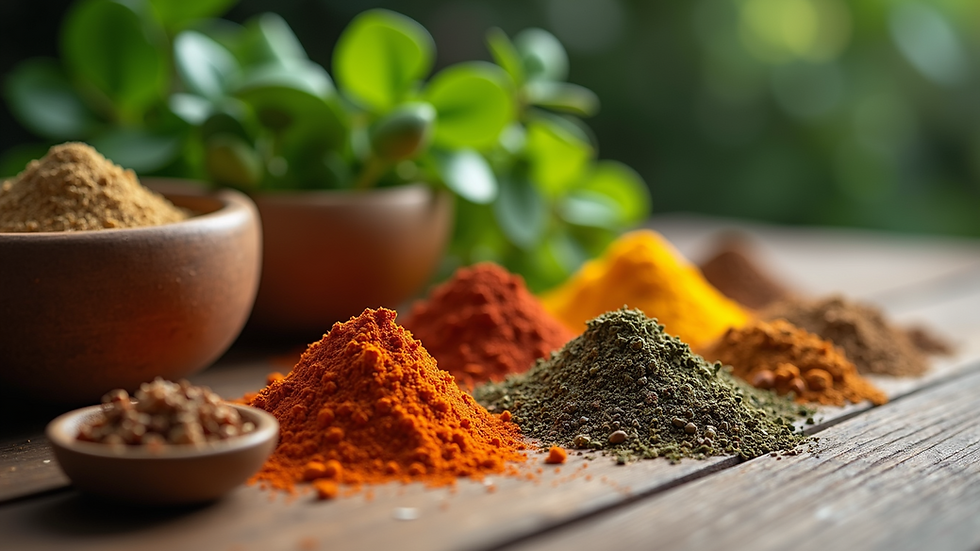How Herbal Remedies Support Your Wellness Journey
- prexim
- Oct 20, 2025
- 4 min read
In today’s fast-paced world, maintaining good health is more important than ever. Many people are turning to natural solutions to support their wellness journey. Herbal remedies have been used for centuries across various cultures to promote healing and balance in the body. These natural treatments offer a gentle yet effective way to enhance your overall well-being without relying heavily on synthetic drugs.
Herbal remedies work by harnessing the power of plants and their active compounds. They can help manage stress, improve digestion, boost immunity, and even support mental clarity. Whether you are new to herbal medicine or looking to deepen your knowledge, understanding how these remedies fit into your lifestyle can be a game-changer.
The Role of Herbal Remedies in Modern Wellness
Herbal remedies are gaining popularity as people seek alternatives to conventional medicine. These natural treatments are often preferred because they tend to have fewer side effects and can be used alongside other therapies. Many herbs contain antioxidants, vitamins, and minerals that nourish the body and help it heal naturally.
Some common herbal remedies include:
Turmeric: Known for its anti-inflammatory properties, turmeric can help reduce joint pain and improve skin health.
Ashwagandha: An adaptogen that helps the body manage stress and improve energy levels.
Ginger: Often used to soothe digestive issues and reduce nausea.
Tulsi (Holy Basil): Supports respiratory health and boosts immunity.
Incorporating these herbs into your daily routine can be as simple as drinking herbal teas, taking supplements, or using topical applications. For those interested in exploring more, ayurvedic herbal supplements offer a wide range of options rooted in traditional Indian medicine.
How Herbal Remedies Enhance Physical and Mental Health
Herbal remedies not only support physical health but also play a significant role in mental wellness. Many herbs have calming effects that help reduce anxiety and improve sleep quality. For example, chamomile tea is widely used to promote relaxation and ease insomnia.
Physically, herbs can aid in detoxification, improve circulation, and support the immune system. For instance, garlic is known for its ability to fight infections and lower cholesterol levels. Regular use of herbal remedies can lead to:
Improved digestion and gut health
Enhanced immune response
Reduced inflammation and pain
Better stress management and mood stabilization
To get the most benefit, it is important to use herbs correctly. Consulting with a healthcare professional or an experienced herbalist can help you choose the right herbs and dosages for your specific needs.
What diseases can be cured by Ayurveda?
Ayurveda, the ancient Indian system of medicine, uses herbal remedies as a cornerstone of its healing approach. It focuses on balancing the body's three doshas - Vata, Pitta, and Kapha - to maintain health and prevent disease. Many chronic and acute conditions can be managed or improved with Ayurvedic treatments.
Some diseases and conditions Ayurveda addresses effectively include:
Arthritis and joint pain: Herbs like turmeric and ashwagandha reduce inflammation and improve mobility.
Respiratory issues: Tulsi and licorice root help alleviate asthma, bronchitis, and coughs.
Digestive disorders: Triphala and ginger support digestion and relieve constipation.
Skin conditions: Neem and aloe vera are used to treat eczema, acne, and other skin problems.
Stress and anxiety: Brahmi and ashwagandha promote mental clarity and calmness.
Ayurvedic herbal supplements are often combined with lifestyle changes such as diet, yoga, and meditation to achieve the best results. This holistic approach helps not only in curing diseases but also in enhancing overall vitality.
Practical Tips for Incorporating Herbal Remedies into Your Daily Life
Starting with herbal remedies can be simple and enjoyable. Here are some practical tips to help you integrate these natural solutions into your wellness routine:
Start with teas: Herbal teas are an easy way to experience the benefits of herbs like chamomile, peppermint, or tulsi.
Use supplements wisely: Choose high-quality ayurvedic herbal supplements from reputable sources to ensure safety and effectiveness.
Cook with herbs and spices: Incorporate turmeric, ginger, garlic, and other herbs into your meals for added health benefits.
Create a herbal self-care routine: Use herbal oils for massage or herbal steam inhalation to relax and detoxify.
Consult experts: Speak with an Ayurvedic practitioner or herbalist to tailor remedies to your unique constitution and health goals.
Remember, consistency is key. Herbal remedies often work best when used regularly over time rather than as quick fixes.
Embracing a Holistic Wellness Journey with Herbal Remedies
Herbal remedies offer a natural path to better health by supporting the body’s innate healing abilities. They complement modern medicine and provide a sustainable way to maintain balance in mind and body. By understanding the benefits and applications of herbs, you can make informed choices that enhance your wellness journey.
Whether you are dealing with specific health issues or simply want to boost your vitality, exploring herbal remedies can open new doors to well-being. Embrace the wisdom of nature and let herbal medicine be a trusted companion on your path to health.
Start small, stay curious, and enjoy the many gifts that herbal remedies have to offer. Your body and mind will thank you for it.




Comments